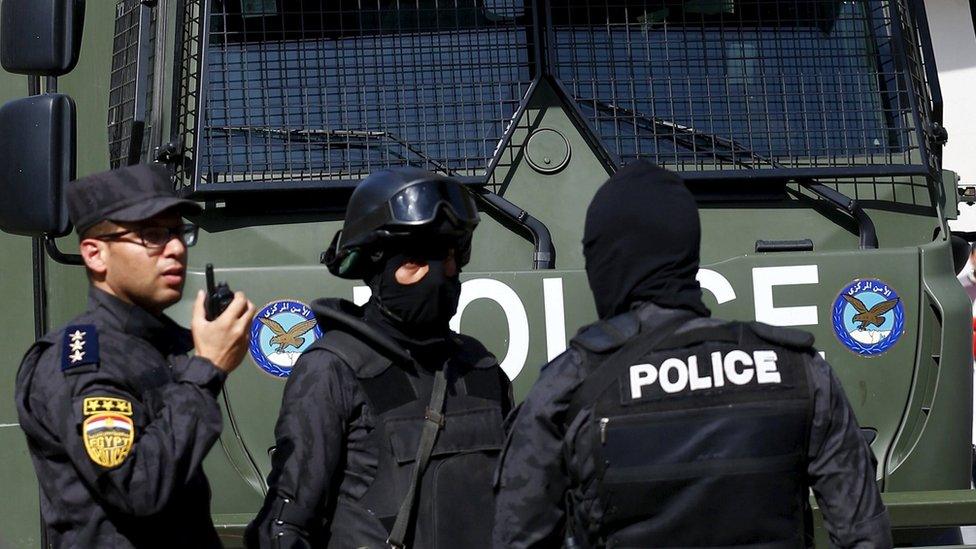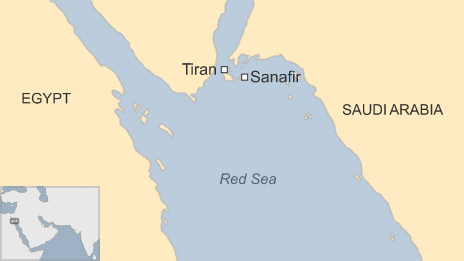Egypt unrest: Sisi warns over anti-government protests
- Published

An anti-protest law gives the authorities the power to ban gatherings of more than 10 people
Egypt's president has warned against what he called attempts to destabilise the state, ahead of planned anti-government protests.
In a televised address, Abdul Fattah al-Sisi said "evil" forces were conspiring against the country but would not succeed.
A range of groups have called for demonstrations, including against the handing of two islands to Saudi Arabia.
Security has been stepped up across the country and at key sites.
The protests have been called in defiance of an anti-protest law that gives the authorities the power to ban gatherings of more than 10 people.
Monday is also a national holiday that marks the anniversary of Israel's withdrawal from the Sinai Peninsula in 1982.
President Sisi's decision earlier this month to cede control over the two Red Sea islands sparked a rare public backlash against him.
He was forced to defend the move, saying the islands - Sanafir and Tiran - had always belonged to Saudi Arabia.
Egyptian troops have been stationed on the islands since 1950 at the request of Saudi Arabia. Critics, though, have objected to the way Mr Sisi has handed them back to Saudi Arabia, saying it is anti-constitutional.
In his speech on Sunday, Mr Sisi said there were "people calling once again for damage to [Egypt's] security and stability.
"Our responsibility is to protect security and stability, and I promise Egyptians that no-one will terrorise them again."
Journalist 'attacked'
Troops have been deployed to key areas of Egypt's main cities, and agents have reportedly rounded up dozens of activists, journalists and lawyers from their homes and cafes in Cairo.
On Monday, three journalists were arrested in central Cairo, the Associated Press news agency quoted a Press Syndicate member as saying, though the grounds for their arrest are not known.
The BBC's Orla Guerin, who is in the Egyptian capital, said in a tweet that pro-Sisi supporters had attacked a colleague, external while a policeman stood by. The colleague was "ok", she said.
Interior Minister Magdy Abdel Ghaffar said security forces would "confront with extreme rigour any attempt to disturb public order", AFP news agency reports.
Observers say public dissatisfaction with Mr Sisi has grown recently because of the poor state of the economy and recent alleged cases of abuse by security forces.
As commander-in-chief of the armed forces in 2013, Mr Sisi led the military's overthrow of President Mohammed Morsi following mass protests against his rule.
Since then, more than 1,000 people have been killed and 40,000 are believed to have been jailed in a sweeping crackdown on dissent, most of them supporters of Morsi's now outlawed Muslim Brotherhood.
Local and international human rights activists say the situation in the country is dire, with Amnesty International saying Egypt has reverted "back to a police state".

Why the Red Sea islands matter
Sanafir and Tiran are islands, about 4km (2 nautical miles) apart in the Red Sea. Tiran sits at the mouth of the Gulf of Aqaba, on a strategically important stretch of water called the Strait of Tiran, used by Israel to access the Red Sea
The islands are uninhabited, apart from Egyptian military personnel and multi-national peacekeepers since 1982
The islands belong to Saudi Arabia, which let Egypt guard them since 1950
Israel captured the islands in 1956 and 1982, subsequently returning them to Egypt both times
Egyptian President Abdul Fattah al-Sisi was criticised for "selling" Egyptian territory after deciding in April 2016 to hand the islands back to Saudi Arabia
